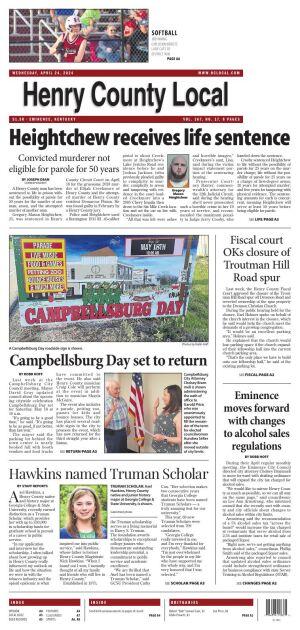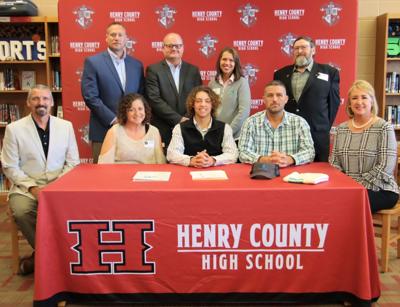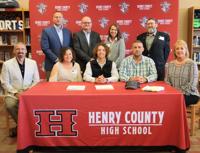Dustin Turner has a solid plan for his future and he’s already working toward his retirement, which is a bit unusual given that Turner is a 16-year-old junior at Henry County High School.
“Right now, I’m only working an hour and a half a day, five days a week, so that’s not much money,” Turner said. “But the work I’m doing now and the time I’m putting in will lead to a really good starting pay when I turn 18 and I can work there full-time, and have a really good retirement. And then when I retire, I’ll probably go find another job. I can’t just sit around, that’s not me.”
Turner’s strong work ethic is one of the reasons he was chosen to be the first student in Kentucky to begin a paid apprenticeship as a Water Systems Operations Specialist at LaGrange Utilities Commission, a member of the Kentucky Rural Water Association (KRWA), thanks to a partnership with the Kentucky Department of Education’s Office of Career and Technical Education and its Tech Ready Apprentices for Careers in Kentucky (TRACK) youth apprenticeship program.
The TRACK program piloted in 2013 in manufacturing with seven students and three employers. Over 500 students and 100 employers have benefitted from the program since its inception.
“There are examples of youth apprenticeship for every career cluster from business students who are working in the financial and insurance industry to an agriculture student apprenticing as a horse trainer on a thoroughbred farm, to health science students in healthcare and dentistry,” said Mary Taylor, Industry Training and Development Specialist with the Division of Technical Schools and Federal Programs at the Office of Career and Technical Education at the Kentucky Department of Education. “Of the students who complete the program, approximately 80 percent of students transition to a full-time apprentice with the same employer after graduation.”
“Dustin is the first youth apprentice in the water service industry. Hopefully, this will open the doors for other high school students in water districts across the state,” Taylor added.
According to KRWA, there are over 400 water and wastewater utilities across the state. Approximately 97 percent of the population in Kentucky has access to public drinking water. This means that, even in the most rural of communities, there exist job opportunities within the water and wastewater industry. Due to a myriad of reasons, Kentucky is facing a shortage of certified operators, making them high in demand and short in supply. It is projected that 30 to 50 percent of Operations Specialists will retire in the next decade. The average age of an operator in Kentucky is mid-50s. Nationally, only 2 percent of operators are age 18 to 25.
“Water and Wastewater Operations Specialists ensure the quality of Kentucky's water resources and protect public health, providing critical services to their communities,” said Heather Stevenson, the Workforce Development Coordinator for the Kentucky Rural Water Association. “Our industry must address the need to train the next generation of skilled workers in order to protect and provide what is arguably the most valuable resource that is essential to all life—clean water.”
Both Stevenson and Taylor point to high school Career and Technical Education (CTE) students who want to co-op as a “virtually untapped talent pool” to help feed Kentucky’s workforce.
“Dustin's signing is a significant milestone for KRWA's Registered Apprenticeship Program (RAP). Dustin is the first high school student to enter into the TRACK youth apprenticeship program with the intent of becoming a Water Systems Operations Specialist apprentice,” Stevenson said. “Our industry knows that we must raise awareness of the value of water, and the career opportunities that abound in the industry in order to train and retain the next generation of water professionals.”
Stevenson said now that one student had enrolled in TRACK, it will allow her organization to share the framework with other utilities and schools to show how these partnerships can be established in their own communities. She credits the perseverance of Scot Treece of LaGrange Utilities Commission and Chelsey Tingle, Assistant Superintendent of Henry County Public Schools, along with Barney Sutley, the Director of Guidance at Henry County High School, for learning about the opportunity that TRACK presented for them both and then identifying a strong candidate.
“We selected Dustin, based on his farming background and interest in working with water and sewer,” Treece said. “He knew college was not the avenue he wanted to take, so this is also his co-op program with the school.”
Since he began his apprenticeship, Turner has helped install water meters, fix water lines, clean out sewer lines, do equipment maintenance, and undergone lots of safety training. This is his first paying job outside of summer work like mowing. He said he likes his co-workers, the pace of the job and the actual work he is doing.
“I can see myself sticking with it. The people there, that’s the main thing. I can do just about anything, work-wise, but the people there, they teach me and they all joke around, too,” Turner said. “And everybody has been so supporting and positive. I haven’t met a single person that knows about this program that hasn’t been supportive. Everybody’s like good job, hope it works out for you. I haven’t met anyone who is negative about it or says this will never work.”
Both Taylor and Stevenson touted the program’s ability to allow students to “learn as they earn,” and accumulate industry hours now that will count toward future certifications, giving Kentucky’s youth a head start in their chosen workforce while avoiding student loan debt, since utilities pay their wages and sponsor the costs of related technical instruction.
“In Dustin's situation, there was an employer that was proactive and saw this as an opportunity to implement a ‘grow your own’ approach to training while introducing a younger generation to the water industry,” Stevenson said. “This is truly momentous for us as an association and for Dustin.”
“We need more employers to give this opportunity to students. High school students taking Career and Technical Education courses are the untapped, continuous and sustainable pipeline for today’s workforce,” Taylor said at the signing. “Kentucky is finding ways to grow its own workforce. Thank you for taking the risk and coming on this journey with us.”
For his part, Turner didn’t even know he was the first student in the state to take on an apprenticeship with a water utility.
“I’ll just go to work every day thinking the same way I did before I knew that. There’s a job to be done so I’m just going to do it and go on. I just happen to be the first one in the state doing this,” Turner said. “My friends say, you’re lucky, you get to leave school, but I’m not just leaving school, I have a job. I sum it up by saying that I’m learning how water gets to your home. And there’s a whole lot more to it than water in a pipe.”















